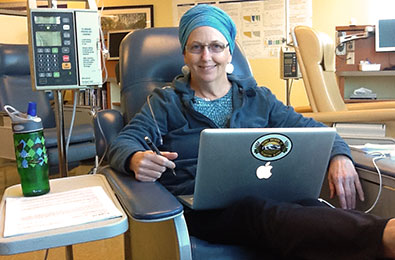
This is an on-going series chronicling my personal journey through the maze of breast cancer diagnosis and treatment.
My husband is driving me to my first chemo session. I am wired from the two doses of steroids required the night prior to and the morning of my treatment. I keep giving him unnecessary directions. He patiently ignores me, and I get the hint: this is strange behavior.
In time, I will come to know this drill, but today it’s all new. I check in; then wait. My name is called and a lab tech fetches me for a blood draw. They need to check my blood count, and liver and kidney function to ensure I’m healthy enough to have chemo.
The oncologist will have the results within 15 minutes. I go have a seat and wait. When I finally see the oncologist, I barrage him with questions. I know I only have 15 minutes, so I have scrutinized my list and put the most important questions first, prepared succinctly to provide more time for answers.
I want to know everything about the type of chemo I will receive to treat was has been determined to be Stage II breast cancer. There will be three different drugs, and I want to know what each one does and how toxic they are.
I ask about the half-life of the chemo drugs and if it’s OK to exercise after therapy, or if I should be sedentary. I want to know why I need such high-dose steroids and if I have an allergic reaction, what then? I ask about the side effects: What is the likelihood I will experience them and if so, the symptoms I can expect and for how long. I want to know what my chances of survival are and my chances for recurrence.
The doctor is patient, taking his time answering. I think of lots of follow-up questions but I have to be reasonable. I let them go. My husband sits quietly next to me, listening. I am confident that, later, if I have forgotten something, I can ask him what the doctor said. One thing I remember clearly is learning that I will lose my hair 18 days after my first chemo.
My consult with the doctor over, he directs us back to the reception area. I turn to leave and don’t realize I’m practically running until I hear my husband far behind, chuckling, and the doctor say, “That’s the steroids at work.”
Maybe the drugs are partly to blame, but I am angry and anxious – my life out of control. I return to the receptionist and curtly tell her that I’m done with the doctor. She smiles and says, “OK. Just go on back to the treatment room.” I stand there, staring. “I don’t know where the treatment room is,” I blurt out. She apologizes and points me in a direction I have never been before. I walk away telling myself to please, please be nice to people.
The treatment room is large and features big windows with a sweeping view. At first glance I see about 15 recliners, each with their own IV poles and most with patients already hooked up. Each has a small chair next to it for a visitor. There is one station positioned in a way that makes it more private; dividers that hold equipment block the view of patients on either side. The nurse greets me and directs me there. I feel lucky to have such a private spot. Later, it becomes clear this is reserved for “first timers” and today is the only time I will sit here.
The nurse is great and I like her instantly. She explains everything as she starts my IV. The pre-medication – more steroids to reduce the risk of having an allergic reaction and anti-nausea drugs – will take an hour and a half. One of these will make me sleepy, and she says she can give it first or last, whichever I prefer. I want it last. I brought my computer and want to get some work done before I fall asleep, throw up, or break out in hives.
The actual chemo drugs will take another three hours. One of these is incredibly toxic if it escapes the vein so they have to give it by “IV push” meaning it doesn’t just hang in a bag like the others. It takes the nurse 20 to 30 minutes to slowly push the drug in from two large syringes. She pulls back on the plunger every few minutes to check for blood in the tubing, thus ensuring she is still in the vein. She encourages me to consider having a “port” surgically placed in my chest for future chemo sessions. Using a port instead of an IV decreases the risk of having drugs infiltrate tissue.
Time passes slowly. I watch the IV bags drip their drugs into me. I get up and use the restroom several times, bringing my IV pole along. I snack from my lunch bag. I work. I read my novel. I feel pretty relaxed. Except for occasional stinging in my vein and slight nausea, I feel fine. My husband comes and goes; checks in to see how I’m doing every few hours. I call my friends and tell them the doctor said I shouldn’t kayak with them this afternoon, as planned. We all laugh. What were we thinking?!
I’m finally done and antsy to move after sitting so long. Though the doctor said exercising helps circulate the drugs, he advised against being out on the water in the event I had a delayed allergic reaction. My husband takes me on a hike up Ridgeline Trail. We go a slow mile; my gut hurts. After a small dinner, we hike another mile up to the ridge behind our home. I walk even slower. I wonder if I can make it back to the house.
To follow Jeannie’s journey, “Like” us on Facebook and visit the Oak Street Medical Blog every Tuesday and Thursday throughout October, Breast Cancer Awareness Month.
 (541) 233-4064
(541) 233-4064 
